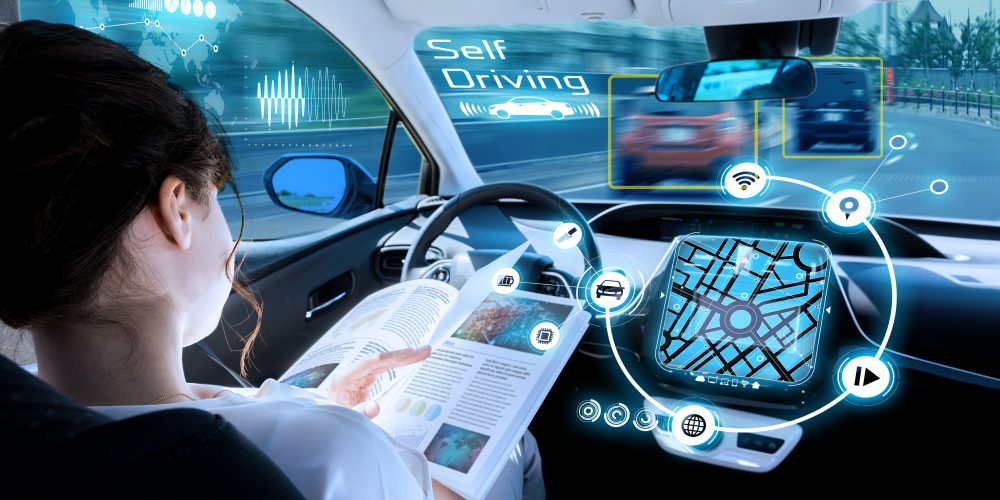Dialogue 1
Jingjing: How's your week going Mark?
京晶:馬克,這周過得怎么樣?
Mark: Pretty well, Jingjing. What about you? Did you buy lots of stuff for double-eleven?
馬克: 不錯,你呢?你雙十一買很多東西了嗎?
Jingjing: Nah, I think it's about time I got a car. So, I'm saving my money for that. I want to buy it free and clear.
京晶:并沒有,我想是時候買輛車了。所以,我正在存錢,我想全款買輛車。
Mark: I thought you had a car already.
馬克:我以為你已經有車了。
Jingjing: Whatever gave you that idea?
京晶:你怎么會那么想?
Mark: I must have gotten confused. Anyway, don't you want to wait a few years, for self-driving cars to become available?
馬克:那我肯定是弄混了。好吧,你不想再等個幾年,等到自動駕駛汽車上市嗎?
Jingjing: A few years? Don't you mean a few decades? I think that kind of technology is a long way off.
京晶:等幾年?你說的難道不是幾十年?我認為自動駕駛技術還遙遙無期呢。
Mark: Are you sure about that? It seems like they're ready to hit the roads now. It's just a matter of testing and laws.
馬克:你確定?它們看起來已經準備好上路了。現在就剩下測試和一些法律事宜了。
Jingjing: Yeah, but that's what I think will take several years rather than just a few.
京晶:是的,這就是為什么我認為還需要好多年而不是幾年的時間。
Mark: You might be right. Oh, that reminds me: I saw an ad for bad drivers, to be used in a testing area for AI.
馬克:可能你是對的。哦,這讓我想起來我看到的一則廣告,駕駛水平差的司機去測試人工智能。
Jingjing: What now? Oh, let me guess: they surround AI cars with human hazards and train them to respond to weird stuff in traffic.
京晶:你說什么? 哦,讓我猜猜:他們模擬智能汽車置身于人們遇到的各種危險之中然后訓練他們對交通中的各種狀況做出正確應對。
Mark: Right on the money!
馬克:完全正確!
Jingjing: Now that I think of it, AI could take the hassle out of expressway driving. I mean, if someone has to drive between cities, they could switch on the AI and relax for quite a while.
京晶:現在我想到的是人工智能可以解決人們在高速公路駕駛時碰到的各種問題。我的意思是,如果有人不得不在兩個城市間奔波,他們可以切換到自動駕駛然后自己輕松一會兒。
Mark: That'd be great. I almost fell asleep at the wheel on a morning drive between Portland and Seattle.
馬克:那太棒了。我早上開車從波特蘭去西雅圖的路上幾乎都睡著了。
Jingjing: What's that: like, a two-hour drive?
京晶:那是什么情況:得開兩個小時嗎?
Mark: Three hours, all on a straight and flat expressway connecting the two cities. I set my cruise control and had the heat way up.
馬克:得三個小時,全在一條筆直平坦連接兩個城市的高速公路上開。我設置好巡航狀態然后開足暖風。
Jingjing: Well, it's a good thing you didn't cause an accident. Yeah, AI could have helped you there.
京晶:哇哦,還好你沒出事故。的確是,人工智能可以在這塊幫到你。
Mark: That would have been a nice nap.
馬克:那會是個美好的打盹時間。
New words : 習語短語
free and clear (adj) 沒有債務;不承擔法律索賠
when a person owns something (typically a vehicle like a car or a boat) and does not have to repay a loan to a bank for its purchase
hazards (noun) 危險;危害
potential dangers, unsafe objects or behaviors
Right on the money! 完全正確
a very accurate guess, or a great insight
take the hassle out of (verb phrase) 把麻煩解決掉 變得更便利
make something more convenient (currently it is difficult)
cruise control (noun) 汽車巡航控制系統
(Cruise Control System, 縮寫為 CCS)
a feature most cars have, to set a certain speed and have the car automatically continue it

Dialogue 2
Jingjing: Mark, what do you think will change when AI takes over our streets?
京晶:馬克,你認為當智能汽車大規模上路后,會有什么改變?
Mark: There was a really cool CNN video about it. They said it might become illegal for humans to drive cars in the future.
馬克:關于這方面,CNN制作過一個很酷的視頻。里面說在未來人類開車可能會成為非法行為。
Jingjing: That sounds a little farfetched. It might become more difficult to get a license.
京晶:聽起來有點牽強。人們可能會更難拿到駕照吧。
Mark: Most interestingly, the video said shared cars will become much more common.
馬克:最有趣的是,視頻聲稱共享汽車將變得更加普遍。
Jingjing: Because of AI? I don't see the connection.
京晶:因為人工智能技術嗎?我看不出有什么聯系。
Mark: Think about how taxis and ride-hailing services are already so popular. If driverless cars were there in place of most taxis, then shared cars would be cheaper than they are now.
馬克:想想看,現在出租車和網約車服務已經非常受歡迎了。如果無人駕駛汽車能夠取代大多數出租車,那么共享汽車的費用將比現在更便宜。
Jingjing: Then more people would use them. There might even be fewer private cars.
京晶:然后更多的人會使用共享汽車。私家車甚至會更少。
Mark: Wouldn't that be great? Instead of traffic jams and parked cars everywhere, there'd be a good number of robot cars.
馬克:這樣不是很好嗎? 不再是隨處可見的堵車和停車場,而是大量的智能汽車。
Jingjing: Hmm, I guess AI could also predict where those cars would be needed most.
京晶:嗯,我想人工智能還可以預測出哪里最需要這些車。
Mark: Yeah, best of all, our streets would have less traffic and fewer parked cars.
馬克:是啊,最棒的是,馬路上跑的車會更少,路邊停放的車輛也會減少。
Jingjing: I like that last part most of all. Nowadays, I can't even go for a walk without weaving my way through a bunch of badly parked cars.
京晶:我最喜歡最后一條。如今,我甚至連出去散步都得來回穿過一堆停得亂七八糟的車。
Mark: Yeah, car storage could be a problem we could leave behind us along with the first quarter of this century.
馬克:是的,我們可能在本世紀的前25年解決汽車停放這個問題。
。
Jingjing: Well that certainly would be nice.
京晶:那最好不過了。
Mark: Imagine, more streets and paths made for walking and biking.
馬克:想象一下,有更多的街道和小路可以用作步行和騎自行車。
Jingjing: Yeah, and fewer traffic jams—that sounds pretty good. The scary thing, though, would be all those lost jobs.
京晶:是的,交通堵塞也少了——聽起來不錯。但可怕的是,那些人全部都會失去工作。
Mark: That's a good point. I read somewhere that 40% or so of the jobs we have today will be replaced by AI.
馬克:有道理。我曾讀到過說,如今40%左右的工作都將被人工智能取代。
Jingjing: Wow, that's something to think about. But right now, that reminds me: I have to get back to work.
京晶:哇,這真是值得思考的事情。但現在,這提醒了我:我得回去工作了。
Mark: Ha ha. Ok, Jingjing. Talk to you next time!
馬克:哈哈。好吧,京晶,下次再聊!
New words : 習語短語
far fetched (adj) adj. 牽強的;亂七八糟的;靠不住的
hard to believe, illogical
ride-hailing services 網約車服務
private cars for hire as taxis











